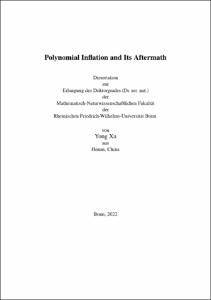Polynomial Inflation and Its Aftermath

Polynomial Inflation and Its Aftermath

| dc.contributor.advisor | Drees, Manuel | |
| dc.contributor.advisor | ||
| dc.contributor.author | Xu, Yong | |
| dc.date.accessioned | 2022-11-10T15:08:21Z | |
| dc.date.available | 2022-11-10T15:08:21Z | |
| dc.date.issued | 10.11.2022 | |
| dc.identifier.uri | https://hdl.handle.net/20.500.11811/10407 | |
| dc.description.abstract | Cosmic inflation elegantly resolves problems in the standard cosmology. The most simple inflationary theory invokes a single scalar field phi, slowly rolling down from a flat potential of a monomial form. However latest Cosmic microwave background (CMB) experiments have ruled out the monomial scenarios. In this thesis, we show that a simple and well motivated small field polynomial of degree four, with a near inflection-point at phi_0 lesssim M_P, can fit comfortably well on current CMB data. This model predicts a testable running of the spectral index around -10^{-3}. A full model parameter space has been obtained by considering Big Bang nucleosynthesis (BBN) constraint on reheating temperature as well as radiative stability conditions; this yields a lower bound phi_0 >3 times 10^{-5} M_P. The inflationary scale within the parameter space can be as low as 1 MeV, or as high as 10^{10} GeV. Similarly, the reheating temperature can lie between its lower bound of 4 MeV and about 4 times 10^8 (10^{11}) GeV for fermionic (bosonic) inflaton decays.
Since any cosmological model has to give rise to successful post-inflationary phenomena, e.g. producing correct dark matter (DM) and baryon densities, we then show that the aftermath of polynomial inflation can easily account for DM production and Baryogenesis (via Leptogenesis) by simply extending the model with a DM field, e.g. singlet fermion or boson and right handed neutrinos (RHNs). It turns out that DM field with mass in the range: O(KeV) lesssim m_chi lesssim O(10^{11}) GeV can account for the correct relic density while being consistent with inflationary predictions and c onstraints from Lyman-alpha and kinematic threshold. For leptogenesis, one can have either thermal channel if the lightest RHN mass lies in 10^{10} GeV lesssim M_1 lesssim 10^{11} GeV or non-thermal channel if 10^{8} GeV lesssim M_1 lesssim 10^{10} GeV, while being consist with neutrino oscillation data and inflationary predictions. Finally we consider the extension to a large field scenario with phi_0 geq 1 M_P. We work out the parameter space consistent with latest CMB measurements at 2 sigma level, and obtain an upper bound phi_0 lesssim 21.5 M_P. We show that the tensor-to-scalar ratio r ranges from O(10^{-8}) to O(10^{-2}), being testable in the near future. This thesis i) offered the most complete analysis for the polynomial inflation to date, and ii) showed that the aftermath of polynomial inflation can account for successful post-inflationary phenomena without jeopardizing the inflationary predictions, hence iii) demonstrated that polynomial inflatio n is an acceptable cosmological framework. | en |
| dc.language.iso | eng | |
| dc.rights | Namensnennung 4.0 International | |
| dc.rights.uri | http://creativecommons.org/licenses/by/4.0/ | |
| dc.subject | Theory of the Early Universe | |
| dc.subject | Cosmic Inflation | |
| dc.subject | Reheating | |
| dc.subject | Dark Matter Theory | |
| dc.subject | Neutrino Masses | |
| dc.subject | Leptogenesis | |
| dc.subject.ddc | 530 Physik | |
| dc.title | Polynomial Inflation and Its Aftermath | |
| dc.type | Dissertation oder Habilitation | |
| dc.publisher.name | Universitäts- und Landesbibliothek Bonn | |
| dc.publisher.location | Bonn | |
| dc.rights.accessRights | openAccess | |
| dc.identifier.urn | https://nbn-resolving.org/urn:nbn:de:hbz:5-68653 | |
| dc.relation.doi | https://doi.org/10.1088/1475-7516/2021/09/012 | |
| dc.relation.doi | https://doi.org/10.1140/epjc/s10052-021-09694-5 | |
| dc.relation.doi | https://doi.org/10.48550/arXiv.2209.07545 | |
| ulbbn.pubtype | Erstveröffentlichung | |
| ulbbnediss.affiliation.name | Rheinische Friedrich-Wilhelms-Universität Bonn | |
| ulbbnediss.affiliation.location | Bonn | |
| ulbbnediss.thesis.level | Dissertation | |
| ulbbnediss.dissID | 6865 | |
| ulbbnediss.date.accepted | 19.10.2022 | |
| ulbbnediss.institute | Mathematisch-Naturwissenschaftliche Fakultät : Fachgruppe Physik/Astronomie / Physikalisches Institut (PI) | |
| ulbbnediss.fakultaet | Mathematisch-Naturwissenschaftliche Fakultät | |
| dc.contributor.coReferee | Bernal, Nicolas | |
| ulbbnediss.contributor.orcid | https://orcid.org/0000-0002-4582-8747 | |
| ulbbnediss.contributor.gnd | 1289102341 |
Files in this item
This item appears in the following Collection(s)
-
E-Dissertationen (4118)




